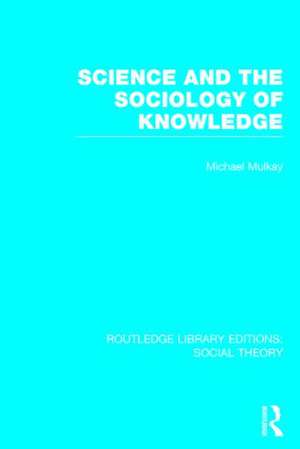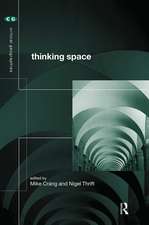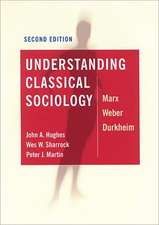Science and the Sociology of Knowledge (RLE Social Theory): Routledge Library Editions: Social Theory
Autor Michael Mulkayen Limba Engleză Hardback – 8 aug 2014
The rest of the book is devoted to developing a preliminary interpretation of the social creation of scientific knowledge. The processes of knowledge-creation are delineated through a close examination of recent case studies of scientific developments. Dr Mulkay argues that knowledge is produced by means of negotiation, the outcome of which depends on the participants' use of social as well as technical resources. The analysis also shows how cultural resources are taken over from the broader social milieu and incorporated into the body of certified knowledge; and how, in the political context of society at large, scientists' technical as well as social claims are conditioned and affected by their social position.
| Toate formatele și edițiile | Preț | Express |
|---|---|---|
| Paperback (1) | 294.77 lei 6-8 săpt. | |
| Taylor & Francis – 20 mai 2016 | 294.77 lei 6-8 săpt. | |
| Hardback (1) | 622.99 lei 6-8 săpt. | |
| Taylor & Francis – 8 aug 2014 | 622.99 lei 6-8 săpt. |
Din seria Routledge Library Editions: Social Theory
-
 Preț: 288.80 lei
Preț: 288.80 lei -
 Preț: 341.55 lei
Preț: 341.55 lei - 55%
 Preț: 658.96 lei
Preț: 658.96 lei - 34%
 Preț: 623.81 lei
Preț: 623.81 lei - 34%
 Preț: 764.20 lei
Preț: 764.20 lei - 34%
 Preț: 652.62 lei
Preț: 652.62 lei - 15%
 Preț: 611.89 lei
Preț: 611.89 lei - 34%
 Preț: 765.01 lei
Preț: 765.01 lei - 18%
 Preț: 847.16 lei
Preț: 847.16 lei - 34%
 Preț: 624.60 lei
Preț: 624.60 lei - 34%
 Preț: 822.34 lei
Preț: 822.34 lei - 34%
 Preț: 850.99 lei
Preț: 850.99 lei - 34%
 Preț: 679.92 lei
Preț: 679.92 lei - 34%
 Preț: 678.28 lei
Preț: 678.28 lei - 34%
 Preț: 765.43 lei
Preț: 765.43 lei - 15%
 Preț: 555.94 lei
Preț: 555.94 lei - 33%
 Preț: 498.99 lei
Preț: 498.99 lei - 34%
 Preț: 624.60 lei
Preț: 624.60 lei - 34%
 Preț: 680.31 lei
Preț: 680.31 lei - 34%
 Preț: 765.01 lei
Preț: 765.01 lei - 22%
 Preț: 311.93 lei
Preț: 311.93 lei - 34%
 Preț: 624.60 lei
Preț: 624.60 lei - 18%
 Preț: 888.99 lei
Preț: 888.99 lei - 34%
 Preț: 624.21 lei
Preț: 624.21 lei - 18%
 Preț: 1005.80 lei
Preț: 1005.80 lei - 34%
 Preț: 765.84 lei
Preț: 765.84 lei - 34%
 Preț: 823.99 lei
Preț: 823.99 lei -
 Preț: 330.87 lei
Preț: 330.87 lei - 18%
 Preț: 1060.25 lei
Preț: 1060.25 lei - 34%
 Preț: 678.69 lei
Preț: 678.69 lei - 18%
 Preț: 886.63 lei
Preț: 886.63 lei - 34%
 Preț: 678.28 lei
Preț: 678.28 lei - 34%
 Preț: 623.81 lei
Preț: 623.81 lei - 34%
 Preț: 682.65 lei
Preț: 682.65 lei - 31%
 Preț: 454.52 lei
Preț: 454.52 lei - 34%
 Preț: 765.43 lei
Preț: 765.43 lei - 25%
 Preț: 277.11 lei
Preț: 277.11 lei - 34%
 Preț: 763.78 lei
Preț: 763.78 lei - 33%
 Preț: 554.64 lei
Preț: 554.64 lei - 34%
 Preț: 680.73 lei
Preț: 680.73 lei - 34%
 Preț: 764.62 lei
Preț: 764.62 lei - 34%
 Preț: 991.80 lei
Preț: 991.80 lei - 34%
 Preț: 763.78 lei
Preț: 763.78 lei - 34%
 Preț: 622.59 lei
Preț: 622.59 lei - 34%
 Preț: 764.62 lei
Preț: 764.62 lei - 18%
 Preț: 1059.45 lei
Preț: 1059.45 lei - 18%
 Preț: 1000.27 lei
Preț: 1000.27 lei
Preț: 622.99 lei
Preț vechi: 941.43 lei
-34% Nou
Puncte Express: 934
Preț estimativ în valută:
119.24€ • 122.88$ • 100.67£
119.24€ • 122.88$ • 100.67£
Carte tipărită la comandă
Livrare economică 03-17 martie
Preluare comenzi: 021 569.72.76
Specificații
ISBN-13: 9781138782471
ISBN-10: 1138782475
Pagini: 142
Dimensiuni: 156 x 234 x 13 mm
Greutate: 0.34 kg
Ediția:1
Editura: Taylor & Francis
Colecția Routledge
Seria Routledge Library Editions: Social Theory
Locul publicării:Oxford, United Kingdom
ISBN-10: 1138782475
Pagini: 142
Dimensiuni: 156 x 234 x 13 mm
Greutate: 0.34 kg
Ediția:1
Editura: Taylor & Francis
Colecția Routledge
Seria Routledge Library Editions: Social Theory
Locul publicării:Oxford, United Kingdom
Cuprins
1. The Customary Sociological View of Science 1.1. The Classic View of Science 1.2. Durkheim and Marx 1.3. More Recent Variants 1.4. Mannheim and Stark 1.5. The Standard View of Scientific Knowledge 1.6. The Sociology of Science 2. Revisions of the Standard View 2.1. The Uniformity of Nature 2.2. Fact and Theory 2.3. Observation in Science 2.4. The Assessment of Knowledge-Claims 2.5. Sociological Implications 3. Cultural Interpretation in Science 3.1. The Social Rhetoric of Science 3.2. The Dynamics of Knowledge-Production 3.3. The Interpretation of Cultural Resources 4. Science and the Wider Society 4.1. Scientists' Use of 'External' Cultural Resources 4.2. The Use of Scientific Culture in External Political Settings 4.3. Brief Summary and Concluding Remarks
Descriere
How far is scientific knowledge a product of social life? In addressing this question, the major contributors to the sociology of knowledge have agreed that the conclusions of science are dependent on social action only in a very special and limited sense. In Science and the Sociology of Knowledge Michael Mulkay's first aim is to identify the philosophical assumptions which have led to this view of science as special; and to present a systematic critique of the standard philosophical account of science, showing that there are no valid epistemological grounds for excluding scientific knowledge from the scope of sociological analysis.
The rest of the book is devoted to developing a preliminary interpretation of the social creation of scientific knowledge. The processes of knowledge-creation are delineated through a close examination of recent case studies of scientific developments. Dr Mulkay argues that knowledge is produced by means of negotiation, the outcome of which depends on the participants' use of social as well as technical resources. The analysis also shows how cultural resources are taken over from the broader social milieu and incorporated into the body of certified knowledge; and how, in the political context of society at large, scientists' technical as well as social claims are conditioned and affected by their social position.
The rest of the book is devoted to developing a preliminary interpretation of the social creation of scientific knowledge. The processes of knowledge-creation are delineated through a close examination of recent case studies of scientific developments. Dr Mulkay argues that knowledge is produced by means of negotiation, the outcome of which depends on the participants' use of social as well as technical resources. The analysis also shows how cultural resources are taken over from the broader social milieu and incorporated into the body of certified knowledge; and how, in the political context of society at large, scientists' technical as well as social claims are conditioned and affected by their social position.

















